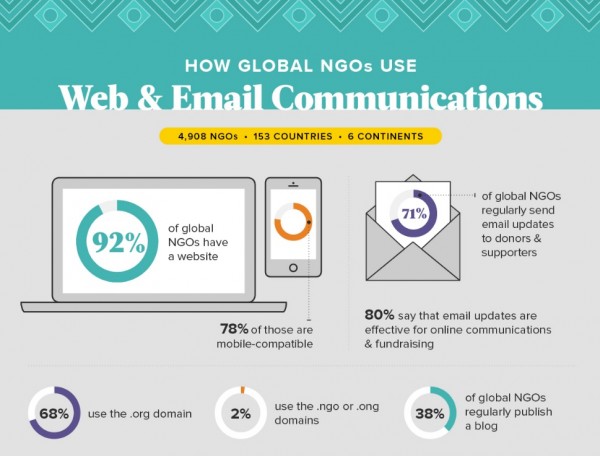
92% of NGOs already have a website and 67% of them accept online donations
These data have been published by the 2017 Global NGO Online Technology Report, in which more than 4,908 NGOs from 153 countries were surveyed.
The report is structured in three main areas: web and email marketing communication, the use of smartphones and online tools to raise funds and the use of social media. In the first place, we can see that 71% of NGOs regularly send emails to their members and supporters. On the other hand, only four in ten NGOs have a blog and almost 80% of them have a website that is mobile and tablet compatible.
As far as fundraising tools are concerned, almost 80% accept credit card donations; 50% through PayPal and only 42% of them through debit card. It is important to emphasise that only 1.5 out of 10 NGOs send texts to its members and supporters on a regular basis.
Regarding NGOs presence on social media, these are the most important data:
- 92% of NGOs have a Facebook page.
- 72% have a Twitter profile.
- 39% have an Instagram profile.
- 55% have a YouTube channel.
- 51% have a Linkedin profile.


92% of NGOs already have a website and 67% of them accept online donations
These data have been published by the 2017 Global NGO Online Technology Report, in which more than 4,908 NGOs from 153 countries were surveyed.
The report is structured in three main areas: web and email marketing communication, the use of smartphones and online tools to raise funds and the use of social media. In the first place, we can see that 71% of NGOs regularly send emails to their members and supporters. On the other hand, only four in ten NGOs have a blog and almost 80% of them have a website that is mobile and tablet compatible.
As far as fundraising tools are concerned, almost 80% accept credit card donations; 50% through PayPal and only 42% of them through debit card. It is important to emphasise that only 1.5 out of 10 NGOs send texts to its members and supporters on a regular basis.
Regarding NGOs presence on social media, these are the most important data:
- 92% of NGOs have a Facebook page.
- 72% have a Twitter profile.
- 39% have an Instagram profile.
- 55% have a YouTube channel.
- 51% have a Linkedin profile.


Share web content much easier with RSS Extended!
NGOs who use the Abcore Cadi Services Platform will have far more flexibility in deciding which part of a web page they want to export to another.
RSS Extended is an advanced version which makes exporting content to another website much easier and more flexible. With this new version, NGOs can choose the specific part of the report or other web content of interest to be shared on the other website. The options that this new version offers are:
- Normal (the RSS feed is taken as it comes, without any changes)
- Only the body (the RSS feed is the body of the news item)
- Complete (the RSS feed is the summary and the body of the news item)
Why is the RSS Extended useful?
To sum up, RSS is very useful for publishing news stories from other websites on your own page, such as those from federal agencies or the media. The benefits are not restricted to this, though. RSS not only allow us to import content onto our own site but also lets others spread content from our web page onto theirs. For example, if a web users want, they can receive in their inbox or on their web page any news that are published on the organisation's website.
This new service is available for all web pages hosted by Abcore Cadi at no extra cost.


Comentari de Yolanda a Fas comunicació?
Jo faig comunicació només a nivell usuari ;), però ho comparteixo a xarxes equip!









